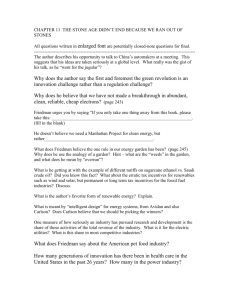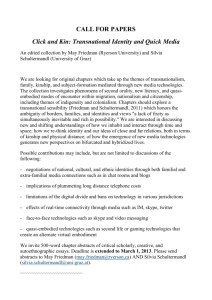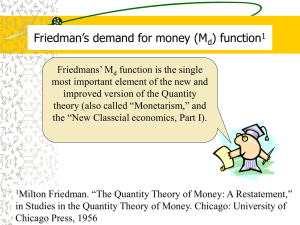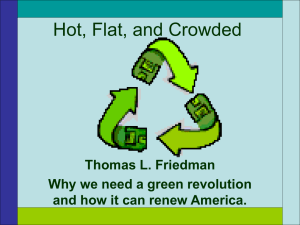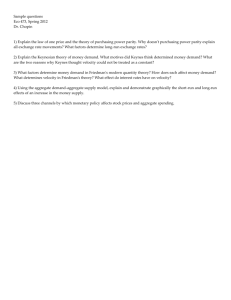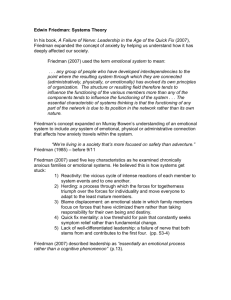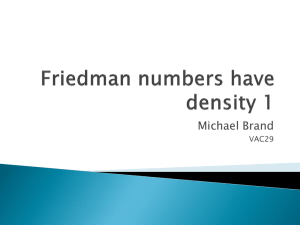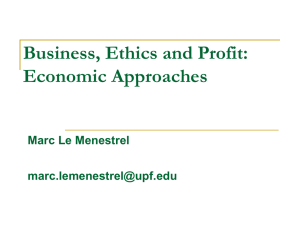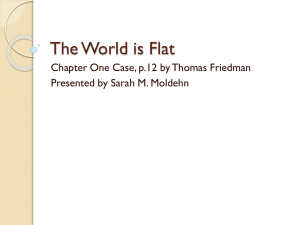Milton Friedman and Rose Friedman, Free to Choose Mariner Books
advertisement
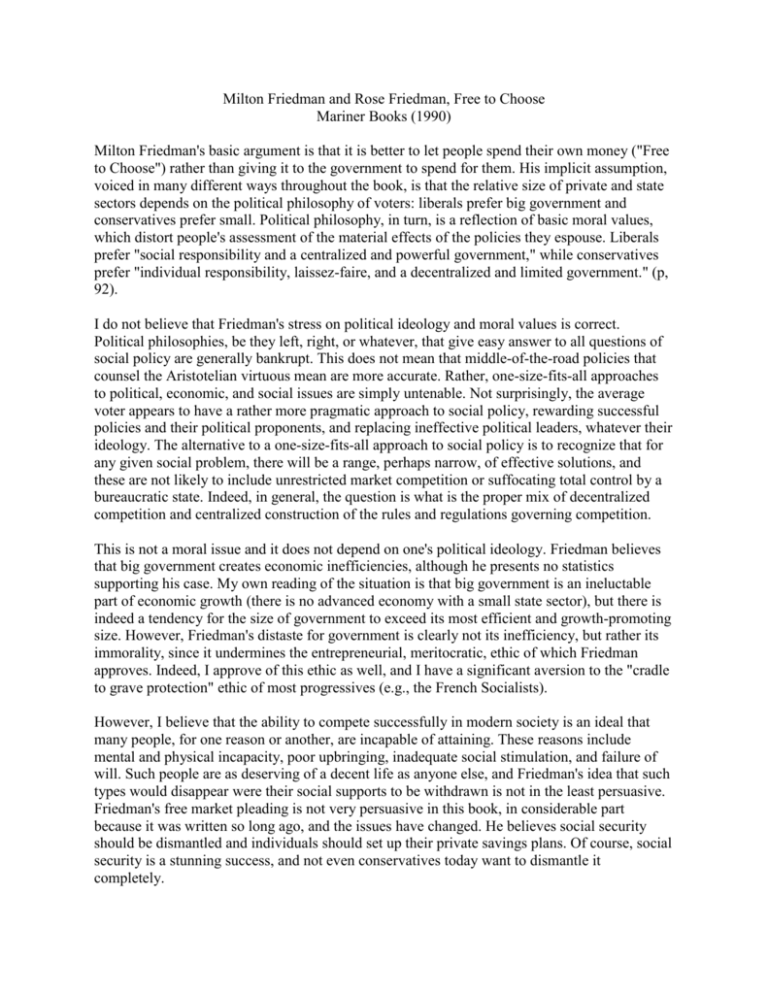
Milton Friedman and Rose Friedman, Free to Choose Mariner Books (1990) Milton Friedman's basic argument is that it is better to let people spend their own money ("Free to Choose") rather than giving it to the government to spend for them. His implicit assumption, voiced in many different ways throughout the book, is that the relative size of private and state sectors depends on the political philosophy of voters: liberals prefer big government and conservatives prefer small. Political philosophy, in turn, is a reflection of basic moral values, which distort people's assessment of the material effects of the policies they espouse. Liberals prefer "social responsibility and a centralized and powerful government," while conservatives prefer "individual responsibility, laissez-faire, and a decentralized and limited government." (p, 92). I do not believe that Friedman's stress on political ideology and moral values is correct. Political philosophies, be they left, right, or whatever, that give easy answer to all questions of social policy are generally bankrupt. This does not mean that middle-of-the-road policies that counsel the Aristotelian virtuous mean are more accurate. Rather, one-size-fits-all approaches to political, economic, and social issues are simply untenable. Not surprisingly, the average voter appears to have a rather more pragmatic approach to social policy, rewarding successful policies and their political proponents, and replacing ineffective political leaders, whatever their ideology. The alternative to a one-size-fits-all approach to social policy is to recognize that for any given social problem, there will be a range, perhaps narrow, of effective solutions, and these are not likely to include unrestricted market competition or suffocating total control by a bureaucratic state. Indeed, in general, the question is what is the proper mix of decentralized competition and centralized construction of the rules and regulations governing competition. This is not a moral issue and it does not depend on one's political ideology. Friedman believes that big government creates economic inefficiencies, although he presents no statistics supporting his case. My own reading of the situation is that big government is an ineluctable part of economic growth (there is no advanced economy with a small state sector), but there is indeed a tendency for the size of government to exceed its most efficient and growth-promoting size. However, Friedman's distaste for government is clearly not its inefficiency, but rather its immorality, since it undermines the entrepreneurial, meritocratic, ethic of which Friedman approves. Indeed, I approve of this ethic as well, and I have a significant aversion to the "cradle to grave protection" ethic of most progressives (e.g., the French Socialists). However, I believe that the ability to compete successfully in modern society is an ideal that many people, for one reason or another, are incapable of attaining. These reasons include mental and physical incapacity, poor upbringing, inadequate social stimulation, and failure of will. Such people are as deserving of a decent life as anyone else, and Friedman's idea that such types would disappear were their social supports to be withdrawn is not in the least persuasive. Friedman's free market pleading is not very persuasive in this book, in considerable part because it was written so long ago, and the issues have changed. He believes social security should be dismantled and individuals should set up their private savings plans. Of course, social security is a stunning success, and not even conservatives today want to dismantle it completely. Conservatives point to the financial problems with social security in the United States, but this is pretty lame critique of social value of the system. The scientific arguments for social security are strong, especially given what we know about hyperbolic discounting (people tend to magnify the value of immediate gratification and underestimate the importance of the long-run) and the tendency of a fair fraction of the public to believe crazy theories of probability and finance (for instance, in the present situation, people saw others taking chances and making money, so reasonably enough, they followed along, leading to a stock market bubble). Libertarians argue that the state has no business countermanding individual preferences (the heart of "free to choose"), but in fact, very often people recognize their own individual weaknesses and prefer that their choices be affected by social policy. For instance, even smokers prefer laws that reduce the incidence of smoking in society, and even savers prefer social security regulation to pure individual responsibility. Friedman also argues against consumer protection laws and socially provided health insurance. These arguments are just silly and are not supported by most conservatives today. He says, for instance, "There will always be shoddy products, quacks, con artists. But on the whole, market competition, when it is permitted to work, protects the consumer better than do the alternative government mechanisms that have been increasingly superimposed on the market." (p. 222) I wonder how an intelligent student of the issues could hold such a totally misguided position. Economists can point to models that show that reputation effects alone are sufficient to ensure the delivery of high-quality goods, but these models depend on highly specialized assumptions that hold only part of the time. The notion that airlines would provide an equal level of safety without FAA regulations and inspections is not plausible, and the same is true of most consumer goods, where at times heavily discounting the future is the firm's profit-maximizing choice. In fact, every advanced economic system has very strong consumer protection laws, and the need for such laws follows from economic theory. Consumers have incomplete information concerning the quality of goods, and it is less costly for the government to provide oversight than having each individual do it for himself. Some claim that reputational effects are sufficient to have the market work well. However, experience shows that firm decision-makers will cut quality to make profits in the present because if profits are low, they will get the boot anyway. For instance, air safety has improved dramatically since the FAA increased safety requirements, and there have been plenty of violators who have be caught by the FAA. Similarly, control of pharmaceuticals is sensible because individuals without the proper training do not know how to medicate themselves, and it is not economically feasible to subject every consumer to the educational requirements for the correct prescription of medications. Friedman is on firmer ground in advocating the legalization of recreational drugs. Most economists probably now accept something close to full legaization for adult consumers as socially optimal. The free market case against universal health insurance, and in favor of private health insurance, is more solid. There is certainly no justification for the government delivering health services, and lots of competition in health care delivery is highly desirable. However, there appears to be a social ethic in favor of such a system being accesible to all (as, for instance, voting or education). Given that, it makes sense to have government-financed health care, although I think a state- rather than federally-based would operate better, because it allows competition among the states for the best system of financing health care. The only policy positions Friedman offers that I think basically accurate are to replace the public school system with a voucher system, and to replace some public support for higher education with a system in which graduates pay for their education according to their future incomes. The public school system is a real anomaly in our society, because it is a governmentsupplied service where there is effectively no competition at all. The group that benefits are school teachers and their unions (workers never want competition in their industry) and politicians who make a living on school boards. Voucher systems give parents a fixed amount of money and allow them to choose their children's schools, while the schools must be duly accredited by the government (as is the case in health care). Charter schools are wholly inferior as an operational concept, because it allows the government to place too many restrictions on what schools are permitted to do, almost predetermining their failure. Teachers' unions know this, so they "compromise" by allowing a few to exist. I also agree with his hostility to promoting unions as a policy tool, although a case can be made that strong minimum wage laws are warranted and the government should promote mechanisms to enhance worker productivity (e.g., life-time apprenticeship programs). The problem with unions is that they are successful only in sectors that have monopoly power. In the current era, that means the state sector. The only exception is the automobile industry, where unions have crippled the ability of American firms to compete, to the point where both the firms and their unions are likely to go under in the next few years. One of Friedman's most creative ideas was the negative income tax, which would allow the dismantling of the whole welfare bureaucracy (a great middle-class boondoggle), replacing social services by pure income support. The Clinton administration did implement the negative income tax, and it has been successful. However, it could only serve as an alternative to the welfare bureaucracy if the poor are "just like everyone else, except they have no money." This is not the fact. Long-term poverty is almost invariably associated with some form of personal disfunctionality, such as mental or physical disease, drug abuse, lack of parenting skills, etc., that require social service administration and control. Friedman describes himself as a libertarian, not a conservative, I am told. I do not think there could be a person more able than Friedman to defend this position, and he does so ineffectively. The notion of free enterprise, virtually unfettered from government regulation, is simply not tenable.
